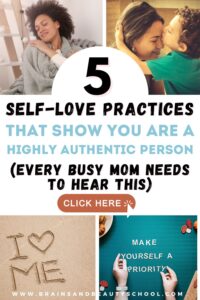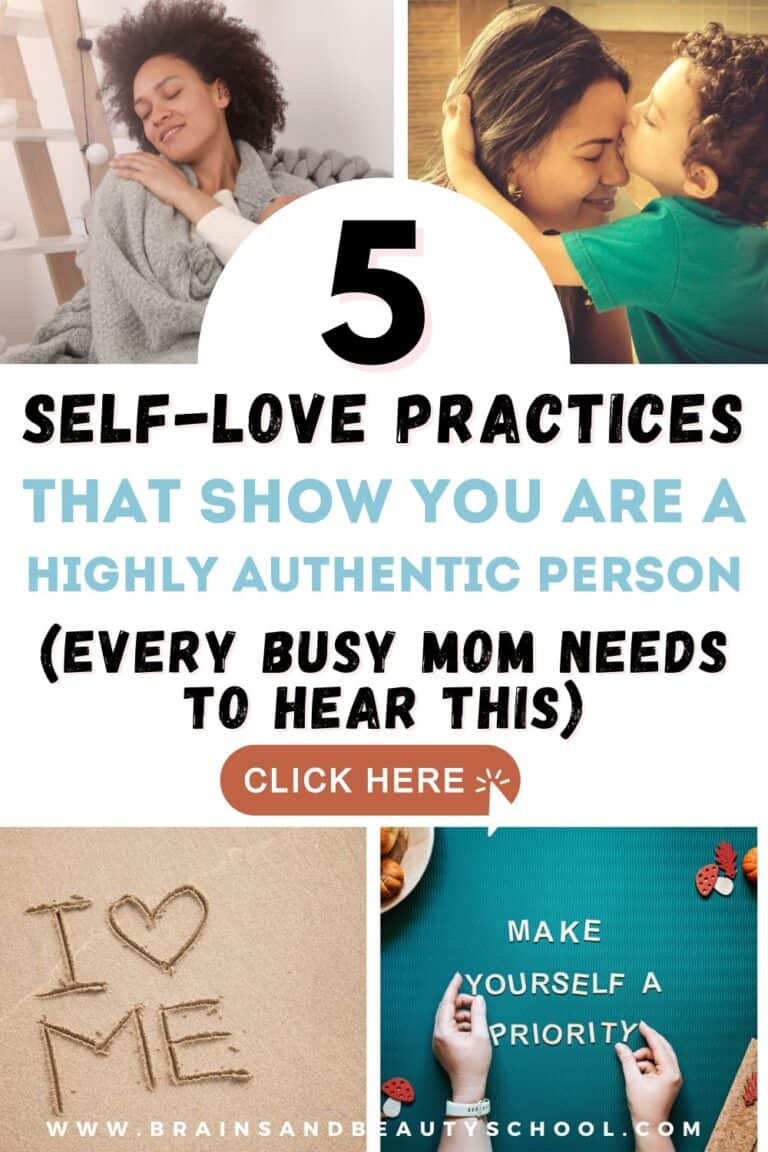Self love Eckhart Tolle quotes can help women balancing careers, motherhood, and personal goals. The demands of daily life often leave little time for reflection or self-care. Yet, Eckhart Tolle’s teachings on mindfulness offer practical guidance for busy moms to rediscover their inner peace and authenticity.
Tolle’s emphasis on present-moment awareness helps women move past mental noise and embrace life’s simplicity. By applying these principles, you can transform your self-perception and create a foundation for true love—starting with yourself. Here are 10 quotes and insights from Eckhart Tolle to guide you toward self-love.

Authenticity is a state of being where your inner self aligns with your outward actions and presence. For many moms in their 30s juggling careers and families, authenticity can feel elusive amid societal pressures and life’s demands. According to Eckhart Tolle, present-moment awareness and letting go of mental noise are essential for discovering your most authentic self. By embracing your true nature, you cultivate inner peace, connect deeply with others, and find joy in everyday life.
How can you tell if you are living authentically?
An authentic person experiences a deep sense of inner stillness and alignment with their values, regardless of external circumstances. You might feel a subtle energy vibration of peace and contentment even during challenging moments. This state of consciousness allows you to accept life as it unfolds, free from the accumulation of psychological time or the pull of past regrets and future worries. Your authenticity shines through when your actions are guided by love and presence rather than fear or ego-driven motives.
What role does self-awareness play in authenticity?
Self-awareness is the cornerstone of authenticity, helping you move beyond mental labels and ego identifications. When you step away from a mind-identified state, you begin to see yourself clearly, free from external forms like social status or physical appearance. This inner transformation fosters genuine relationships, as others are drawn to your honesty and grounded presence. As Eckhart Tolle teaches, authenticity arises from the act of far greater power: being fully present in each moment.
How does authenticity affect your relationships?
Authenticity creates the foundation for successful relationships by fostering genuine connection and deep trust. When you approach intimate relationships with enough presence, you dissolve inner conflict and open the door to true love. The joy of just being, rather than striving for a good future or fearing loss, allows you to appreciate others without mental noise or judgment. Authentic relationships are not bound by circumstances of your life but grow from your ability to see others as they truly are.
Why is authenticity important for personal fulfillment?
Living authentically allows you to access the most precious thing: a sense of the miraculous in everyday life. When you accept yourself without resistance, even small things can bring immense joy and meaning. Authenticity transforms challenges into stepping stones, creating a sense of quality and purpose in all you do. As Eckhart Tolle reminds us, authenticity is not a passive state but a dynamic evolution of your consciousness, enabling you to live with true happiness and freedom.
5 Self Love Eckhart Tolle Quotes
1. The Connection Between Self-Love and Present-Moment Awareness
Self-love begins when you live fully in the present. Eckhart Tolle explains that the Now is the most precious gift we have.
“Realize deeply that the present moment is all you ever have. Make the Now the primary focus of your life.”
For moms, mindfulness during everyday routines can shift your mindset. Focus on small moments like reading a bedtime story or sipping your morning coffee. These acts can anchor you in the present and reduce stress.
The Connection Between Self-Love and Present-Moment Awareness
Self-love thrives when you learn to fully inhabit the present moment. Eckhart Tolle emphasizes that present-moment awareness is the foundation of inner peace and happiness. When you stop denying the present or being consumed by thoughts of the past or future, you begin to experience the most precious thing: the Now. This shift allows you to connect with yourself on a deeper level and embrace life as it is, rather than how you think it should be.
Tolle’s wisdom invites us to recognize that “the present moment is all you ever have. Make the Now the primary focus of your life.” For busy moms balancing professional and personal responsibilities, this truth can be transformative. Rather than letting the demands of your schedule define your sense of self, you can practice mindfulness in small, intentional ways. This inner transformation fosters a greater sense of calm, even amid chaos.
Consider how mindfulness can enhance your everyday life. Reading a bedtime story to your child can become a moment of connection instead of another item on your to-do list. Sipping your morning coffee can become an act of presence, where you tune into the warmth of the cup and the aroma of the brew. These small things help ground you in the present, dissolving the mental noise that often accompanies a mind-identified state.
By making the Now your focal point, you also reduce the primary cause of unhappiness: the denial of the present. When you stop resisting what is and embrace your circumstances, even difficult moments become stepping stones to greater inner peace. This practice is an act of far greater power than striving for a better future or dwelling on past regrets. Self-love begins here, with an alert attention to your life as it unfolds in the present.
2. Inner Peace vs. Mental Noise
Mental noise is the endless chatter of thoughts about the past or future. This noise often prevents self-love.
“The primary cause of unhappiness is never the situation but your thoughts about it.”
To combat this, try a simple breathing exercise. Take 3 deep breaths whenever you feel overwhelmed. Journaling your thoughts is another way to quiet the mind and focus on the Now.
Inner Peace vs. Mental Noise
Mental noise is the constant chatter in your mind, often focused on worries about the past or anxiety about the future. This mental activity can drown out your ability to experience inner peace and practice self-love. Eckhart Tolle explains that “The primary cause of unhappiness is never the situation but your thoughts about it.” This profound insight highlights how our internal dialogue, shaped by fear, regret, or anticipation, often clouds our ability to find peace in the present. By shifting our attention away from these thought patterns, we can begin to dissolve the mental noise and rediscover a deeper sense of self-love.
For many moms, mental noise is especially overwhelming. The demands of work, family life, and personal expectations can leave little room for inner stillness. Thoughts about responsibilities, future plans, or past decisions swirl constantly, preventing you from feeling truly at peace. When you’re caught in this cycle, it’s difficult to experience the love and care you deserve, as your mental energy is consumed by everything outside of the present moment.
To combat mental noise, it’s essential to practice methods that help ground you in the Now. One of the simplest and most effective techniques is deep breathing. Whenever you feel overwhelmed by racing thoughts, pause and take three slow, deep breaths. This practice helps you center your awareness, allowing the mind to settle and the body to relax. With each breath, you are reminded that the present moment is enough—there’s nothing to worry about, nothing to rush toward.
Another helpful method is journaling. Writing down your thoughts can provide a release for your mind, helping you detach from the constant mental activity. It’s a way to process emotions and clear your head so you can return to the present with greater clarity. As you reflect on your thoughts, you begin to notice patterns that may be contributing to mental noise. By acknowledging these thoughts, you create space for the more meaningful, peaceful thoughts that align with your true self. These practices, along with consistent mindfulness, enable you to experience greater inner peace and self-love.
3. Letting Go of External Validation
Ego identifications—social status, appearance, and achievements—often distort our sense of self. Tolle reminds us that true self-love requires looking inward.
“To love is to recognize yourself in another.”
Release the need for perfection in your roles as a mom and professional. Start by celebrating small successes rather than seeking external approval.
Letting Go of External Validation
In today’s world, it’s easy to get caught up in seeking approval from others. Many people, especially moms who juggle multiple roles, tie their sense of worth to external validation—whether it’s social status, appearance, or professional achievements. However, Eckhart Tolle warns that these ego identifications distort our true sense of self and hinder self-love. He teaches that “To love is to recognize yourself in another.” This means that true love, including self-love, arises not from the validation of others but from recognizing our inherent worth and connection to the world around us. When we learn to love ourselves from within, free from the need for external approval, we tap into a deeper, more authentic sense of peace.
For many moms, the pressure to be perfect in all aspects of life—whether it’s in your role as a mother, a professional, or a partner—can be overwhelming. We may feel that we need to meet certain expectations or achieve certain milestones to feel validated. Yet, Tolle reminds us that this constant pursuit of external validation is one of the most common ego identifications. It distances us from our true selves, as we start measuring our worth based on external outcomes. When your sense of self relies on social status, appearance, or achievements, it becomes fragile, always dependent on others’ opinions or circumstances.
Letting go of this need for perfection and external validation is a key step toward self-love. The pressure to be a perfect mom or to have an ideal career can leave you feeling inadequate. Instead of striving for unattainable standards or comparing yourself to others, practice celebrating small successes. Whether it’s taking a moment to acknowledge that you managed to make dinner, complete a work task, or simply made time for yourself, these achievements are significant. By honoring the everyday moments, you gradually begin to shift away from seeking validation from the outside world. This inner recognition of your accomplishments is a powerful form of self-love.
This shift in mindset also invites more authentic connections with others. Instead of relying on social status or appearance to feel valued, you begin to form genuine relationships. True love, as Tolle suggests, is about recognizing yourself in another. When you let go of external validation, you begin to love and accept others as they are, without judgment or comparison. You also extend that same love to yourself, acknowledging that your worth is not determined by how others see you but by the love and acceptance you cultivate within. This internal shift leads to a more peaceful, fulfilling life—one grounded in the present moment and self-love, free from the need for external approval.
4. Overcoming Fear and Emotional Pain
Fear often blocks self-love, whether it’s fear of failure or loss. Tolle teaches us to see fear as a construct of the mind.
“What a liberation to realize that the ‘voice in my head’ is not who I am. Who am I then? The one who sees that.”
Write down your fears and examine them from a neutral perspective. Pair this exercise with gratitude journaling to shift your mindset.
Overcoming Fear and Emotional Pain
Fear is one of the most common obstacles to self-love. Whether it’s the fear of failure, fear of loss, or fear of not measuring up, these emotions often prevent us from fully embracing and accepting ourselves. Eckhart Tolle explains that fear is not a reality; it is a mental construct, a product of our thoughts. He teaches, “What a liberation to realize that the ‘voice in my head’ is not who I am. Who am I then? The one who sees that.” This quote offers a profound insight: our fears are not part of our true self, but merely transient thoughts that can be observed and released. When we learn to separate ourselves from the fear-based thoughts in our minds, we begin to open up to a deeper sense of inner peace and self-acceptance.
For many women, fear manifests in various forms—fear of not being a good enough mom, fear of not succeeding in their careers, or fear of losing control in life. These fears can create emotional pain, often causing feelings of inadequacy, anxiety, or self-doubt. But Tolle encourages us to recognize that these fears are not our true identity. When we identify with our fears, they can dominate our lives and prevent us from fully embracing the present moment. By acknowledging that we are not our thoughts or fears, we can start to disempower them and regain control over our emotional well-being.
One effective way to overcome fear and emotional pain is to bring awareness to it. Start by writing down your fears—take them out of your mind and onto paper. This exercise allows you to examine them from a neutral, objective perspective. Are these fears based on past experiences, or are they projections about an uncertain future? When you give your fears a name and analyze them, they lose much of their power over you. This simple act of awareness and reflection helps you realize that the fear itself is not a permanent fixture in your life; it’s just a passing thought that doesn’t define you.
Pair this practice with gratitude journaling to shift your mindset. Focusing on the present moment and what you’re grateful for helps to counterbalance fear. It trains your mind to look for the positive aspects of life instead of being consumed by worry. For example, as you journal about the small, meaningful moments in your life—like a hug from your child or a moment of quiet reflection—your fears begin to feel less overwhelming. The practice of gratitude nurtures your inner peace, making it easier to overcome emotional pain and embrace self-love. By regularly acknowledging your fears and pairing this awareness with gratitude, you create a space of acceptance, allowing emotional pain and fear to dissolve more easily.
5. Self-Love Through Acceptance and Stillness
Acceptance is key to self-love. Instead of resisting life’s challenges, Tolle encourages us to embrace them.
“Whatever the present moment contains, accept it as if you had chosen it.”
For moms, this means letting go of guilt on tough days. Acknowledge that not every moment will be perfect, and that’s okay.
Self-Love Through Acceptance and Stillness
Acceptance is one of the foundational aspects of self-love. It requires us to fully embrace who we are in the present moment, without judgment or resistance. According to Eckhart Tolle, “Whatever the present moment contains, accept it as if you had chosen it.” This powerful quote highlights the importance of accepting not just the good moments, but also the challenging ones, as they are part of our human experience. By practicing acceptance, we create space for inner peace, letting go of the tension that arises from constantly fighting against what is.
For moms, this can be especially difficult. The constant juggling of responsibilities—whether it’s managing a career, caring for children, or maintaining relationships—often leads to feelings of guilt when things don’t go as planned. Perhaps you didn’t get everything done on your to-do list or had an argument with your partner. You may feel frustrated or disappointed with yourself. However, Tolle teaches us that resistance only adds to the suffering. Instead of dwelling on mistakes or setbacks, try to accept each moment as it comes. Recognize that not every day will be perfect, and that imperfection is a natural part of life.
Letting go of guilt is a crucial aspect of self-love, especially for moms. It’s easy to become overwhelmed by unrealistic expectations—whether they’re self-imposed or influenced by society. When we don’t meet these expectations, we often feel as though we are failing, which can hinder our ability to show ourselves compassion. By embracing the challenges of motherhood without judgment, we can release the burden of perfectionism. For example, on days when everything seems to go wrong, instead of criticizing yourself, simply accept that this is part of the journey. It’s through this acceptance that we create space for personal growth, self-compassion, and a deeper connection with our true selves.
Acceptance also goes hand-in-hand with stillness. By taking moments of stillness throughout your day—whether it’s a few quiet minutes in the morning, a short walk, or simply pausing before reacting to a stressful situation—you can center yourself in the present moment. Stillness allows you to observe your thoughts and emotions without being swept away by them. It is in these moments of calm that you can practice self-love by accepting things as they are, without the need to change or fix them immediately. This practice of acceptance and stillness creates a powerful foundation for self-love, helping you navigate life’s ups and downs with grace and inner peace.
By choosing to accept whatever the present moment contains—whether it’s a messy house, a chaotic workday, or a difficult conversation with a loved one—you give yourself the gift of peace. This act of acceptance fosters a deep sense of self-love, as it allows you to be at peace with yourself no matter what circumstances arise. As a mom, embracing both the small and big challenges with open arms can transform your relationship with yourself and your life. Self-love through acceptance and stillness isn’t about achieving perfection; it’s about being present and kind to yourself in all circumstances.
Navigating the Balance Between Work, Family, and Self-Love
For moms in their 30s, balancing a full-time career, family life, and personal well-being can often feel like a never-ending struggle. It’s easy to get caught up in thoughts about the future—planning for the next promotion, wondering about your child’s college tuition, or managing work deadlines. Eckhart Tolle emphasizes the importance of staying grounded in the present moment. When you focus too much on the future, you miss out on the life that’s unfolding right now. “The primary cause of unhappiness is never the situation but your thoughts about it.” The constant preoccupation with the future creates unnecessary stress and distracts from being fully engaged in the present.
Living in the present moment is essential for self-love. Tolle teaches us that “the power of now” is the gateway to inner peace. Moms in their 30s, especially those balancing a career and family, often find themselves caught in a cycle of endless tasks that seem to stretch into the future. But the reality is that focusing on too much future leaves little room to enjoy today’s blessings. Whether it’s playing with your kids or simply taking a moment to appreciate a quiet cup of coffee, these small, everyday experiences make up the “whole life” that you have right now. Instead of worrying about what’s coming next, try to savor these moments of stillness and connection.
Just as focusing too much on the future can cloud our joy, dwelling too much on the past can also prevent us from experiencing self-love. Tolle discusses how our attachment to past experiences and belief systems often creates “forms of fear” and unnecessary emotional baggage. For moms, this might look like guilt over past decisions—whether it’s a career move or parenting choices. These thoughts are grounded in “too much past” and can prevent you from moving forward. But by letting go of these attachments and focusing on the now, you can create a healthier mindset. Acknowledging the present frees you from the constraints of past regrets, giving you permission to live more authentically and with purpose.
One of the most profound aspects of motherhood and professional life is the need for genuine relationships. Whether it’s your relationship with your children, your partner, or coworkers, authentic connections are essential. Tolle emphasizes that the more we connect with others through presence, the more we transcend the ego. A genuine relationship—one that’s not clouded by superficial expectations or driven by external pressures—gives us a deeper sense of belonging. When you can approach your relationships with a sense of presence, not clouded by your past or future, you find that your connections become richer and more meaningful.
For working moms, it’s also important to find balance between your “outer purpose” and your deeper, inner purpose. Your “outer purpose” is what you do in the world: your job, your responsibilities, your roles. But your “inner purpose” is about who you are at your core. Tolle teaches that true self-love comes when you align both of these purposes. Rather than simply focusing on external achievements, take time to connect with your inner self. This approach not only improves your mental and emotional well-being but also allows you to show up as your most authentic self in both your career and your home life. By practicing presence and self-love, you can create a life where your outer purpose aligns with your inner purpose, allowing you to thrive in every aspect of your life.
FAQ Section
1. What is Eckhart Tolle’s primary teaching on self-love?
Tolle emphasizes present-moment awareness and inner peace as the foundation of self-love.
2. How does present-moment awareness improve self-love?
It reduces mental noise, allowing you to see yourself clearly and accept life as it unfolds.
3. Can moms realistically find time for mindfulness?
Yes. Focus on small moments like morning coffee or evening quiet time to practice mindfulness.
4. How can mindfulness improve relationships?
It creates space for genuine connections by removing ego-driven thoughts and expectations.
5. What are common blocks to self-love according to Eckhart Tolle?
Fear, ego identifications, and denial of the present are major obstacles.
Eckhart Tolle’s teachings remind us that self-love is not about fixing ourselves but about accepting and appreciating who we are in the present. For busy moms, these lessons are a lifeline, offering a way to find peace amidst the chaos. Start today by practicing mindfulness and making the Now your priority.









